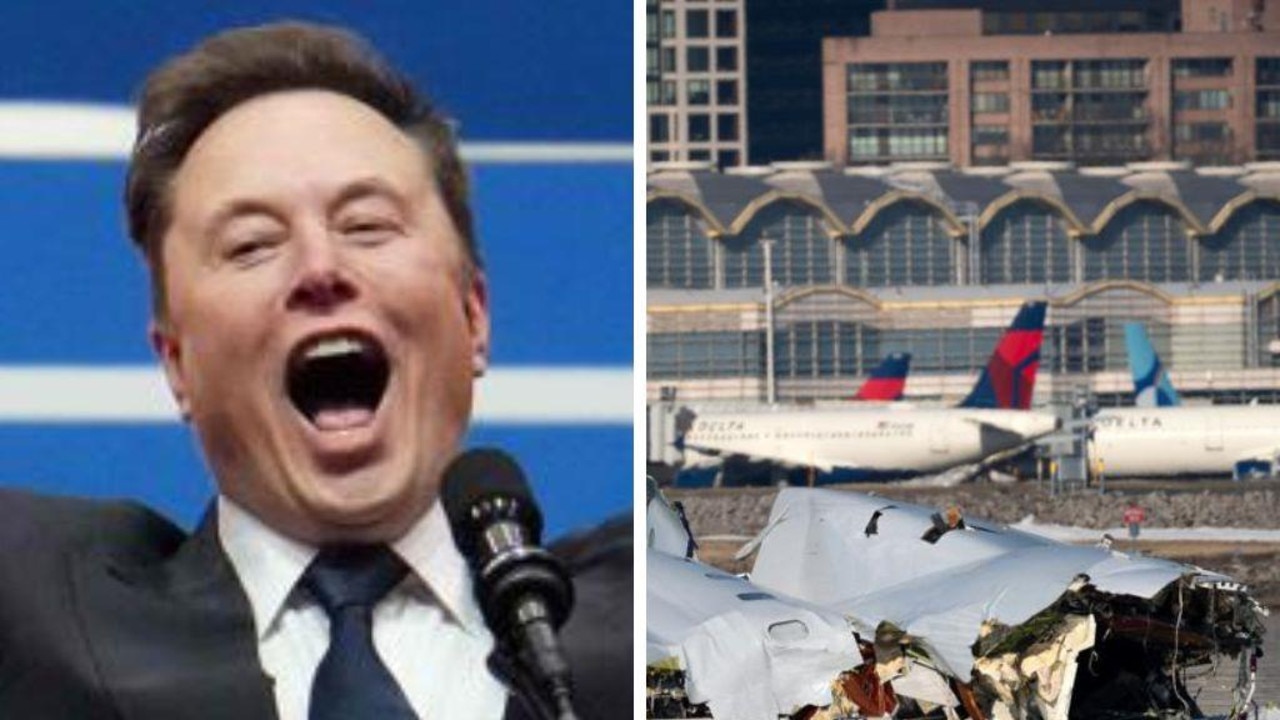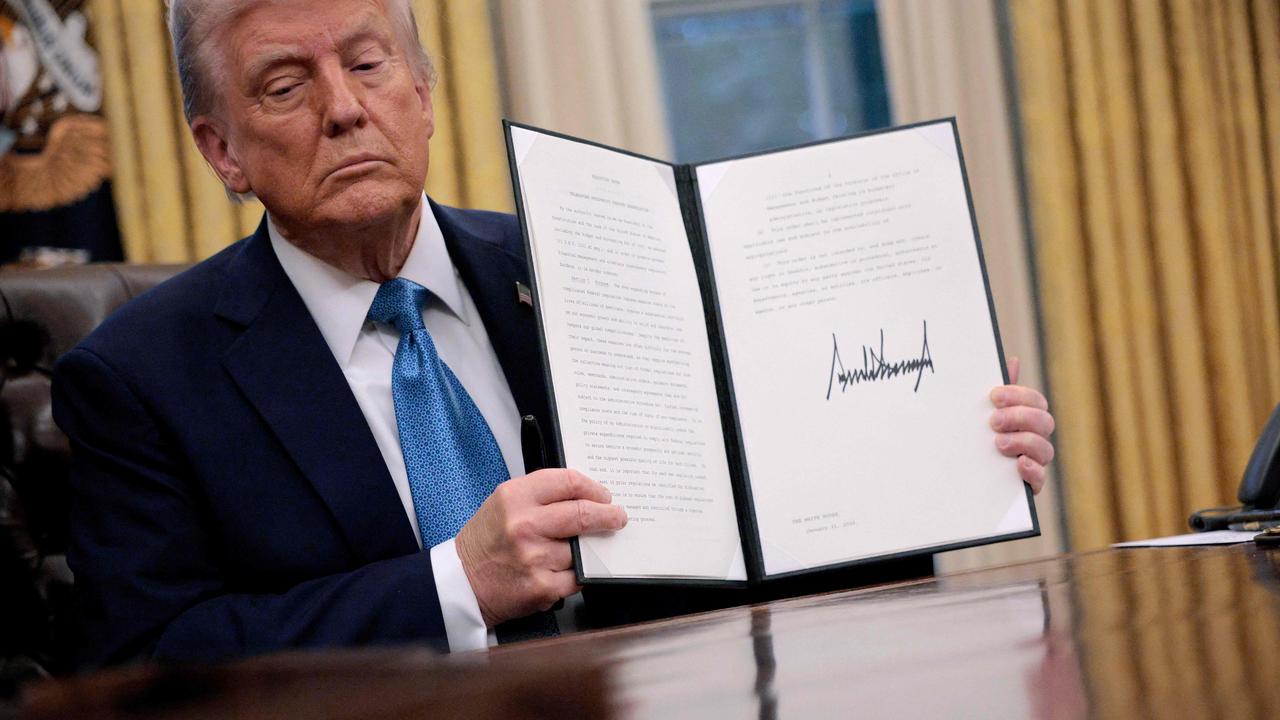Peter Dutton: China military response to US House Speaker Nancy Pelosi visit ‘disproportionate’
Australia’s Opposition Leader Peter Dutton had some choice words about China’s military response to US House Speaker Nancy Pelosi’s visit to Taiwan last week. HAVE YOUR SAY.
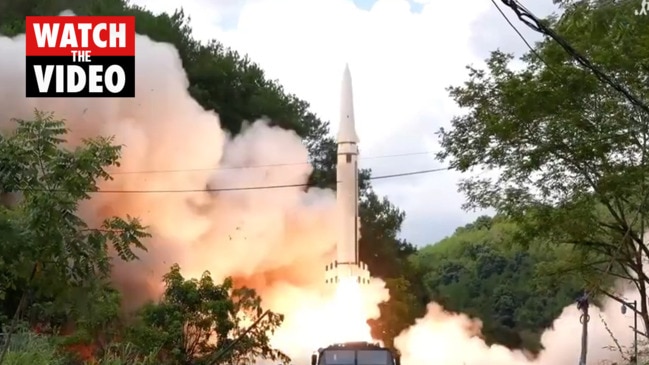
World
Don't miss out on the headlines from World. Followed categories will be added to My News.
Opposition Leader Peter Dutton has backed an overnight trip by US House Speaker Nancy Pelosi to Taiwan, saying the response from China had been “completely over the top” and “quite phenomenal”.
China had launched unprecedented aggression towards Taiwan in recent days, including shooting 11 ballistic missiles over Taiwan and near Japan in a formidable display of military build-up launched in response to Ms Pelosi’s visit.
China has since declared itself the “victim” and criticised the Australian government for “unacceptable finger-pointing” after Foreign Minister Penny Wong joined US and Japan in condemning Beijing’s actions.
Mr Dutton, speaking in Brisbane on Monday, said he was “pleased” Ms Pelosi had visited Taiwan as it showed China’s “disproportionate” reaction.
He said “should be very clear” no one was advocating for a shift from the “One China” policy.
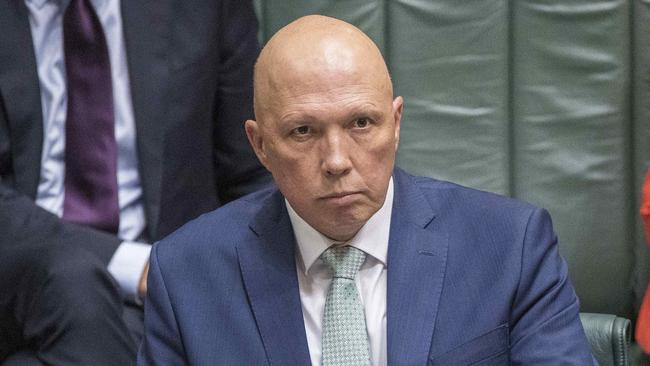
“Nobody advocates, no the United States, not Australia, for changing the circumstances in relation to Taiwan,” Mr Dutton said.
“But at the same time, the Chinese government‘s reaction under President Xi has been wildly disproportionate.
“And I think when you look at what we‘ve had to say, when we were in government over the course of the last couple of years, this has been entirely predictable.
“China is amassing nuclear weapons and when we say that we‘re in a period, similar to the 1930s, that that is not made up, it’s not exaggerated.”
Mr Dutton said Australia’s trading relationship with China was “very important” and should continue, but there should also be peace within the region and Australia needed to work with allies to “deter China from taking any action against Taiwan”.
CHINA SPEWS OVER WONG’S ‘FINGER-POINTING’; LAUNCHES NEW DRILLS
China says it is the “victim” after launching live-fire drills around Taiwan and accused Foreign Minister Penny Wong of “finger-pointing”.
“It is absolutely unacceptable for the finger-pointing on China’s justified actions to safeguard state sovereignty and territorial integrity. We firmly oppose and sternly condemn this,” a spokesman at China’s embassy in Canberra said, according to The Australian.
Ms Wong last week called for calm between China and the US.
Speaking with ABC AM on Wednesday, the Foreign Minister called for a de-escalation of tension between the two countries.
“All parties should consider how they best contribute to de-escalating the current tensions, and we all want peace and stability in the Taiwan Strait,” Senator Wong said.
“We do have a situation where we see rhetoric increasing and we see military hardware being deployed.”
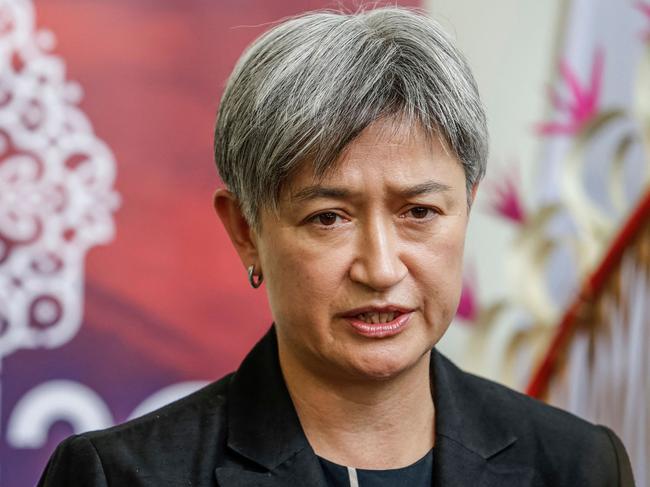
It comes as Beijing announced fresh drills in the Yellow Sea - located between China and the Korean peninsula - to take place until August 15.
In response, Taiwan said it had mobilised a “joint intelligence surveillance and reconnaissance system to closely monitor the enemy situation” as well as sending planes and vessels.
Su Tseng-chang, Taiwan’s premier, said China is “barbarously using military action” to disturb peace in the Taiwan Strait.
“We call on the Chinese government not to go around wielding its military power, showing its muscles everywhere and jeopardising the peace of the region,” he told reporters Sunday.
Taipei’s foreign ministry said the drills threatened “the region and even the world”.
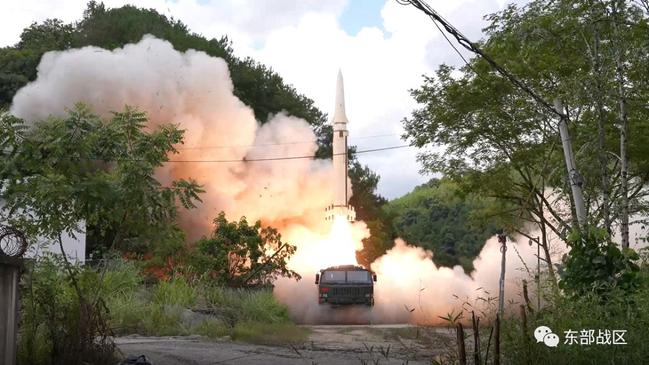
To show how close it has got to Taiwan’s shores, the Chinese military released a video of an air force pilot filming the island’s coastline and mountains from his cockpit.
The Eastern Command also shared a photo it said was of a warship on patrol with Taiwan’s shoreline visible in the background.
Ballistic missiles were also fired over Taiwan’s capital during the drills, according to Chinese state media.
Meanwhile, China’s largest-ever military exercises surrounding Taiwan are drawing to a close following a controversial visit last week to the island by US House Speaker Nancy Pelosi.
Beijing has raged at the trip by Ms Pelosi - the highest-ranking elected US official to visit Taiwan in decades - ripping up a series of talks and co-operation agreements with Washington, most notably on climate change and defence.
It has also deployed fighter jets, warships and ballistic missiles in what analysts have described as practice for a blockade and ultimate invasion of the self-ruled island - which China claims as its territory.
Those exercises were supposed to end on Sunday, but neither Beijing nor Taipei confirmed their conclusion, though Taiwan’s transport ministry said it had seen some evidence suggesting at least a partial drawdown.
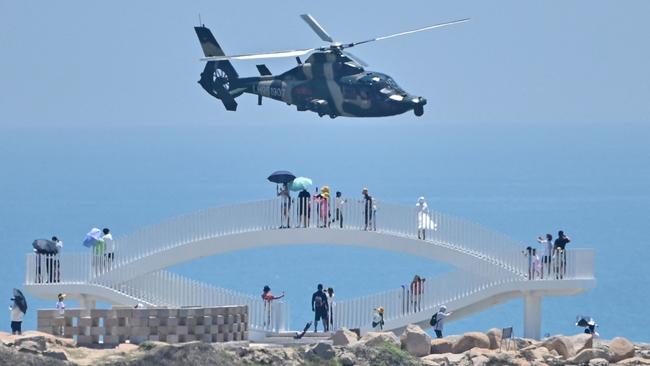
Beijing conducted “exercises in the sea and airspace surrounding Taiwan Island as planned”, the Chinese military’s Eastern Command said.
Taipei’s defence ministry confirmed China had dispatched “planes, vessels and drones … simulating attacks on Taiwan’s main island and on ships in our waters”.
It detected 66 air force planes and 14 warships operating in the Taiwan Strait, of which 22 crossed the median line and the extended area of the unofficial demarcation in the waters that separate Taiwan and China.
China also sent at least one drone over Taiwan’s outlying Kinmen islands, forcing troops to respond with flares, local authorities said.
China’s defence ministry did not respond to a request for comment about the expected conclusion of the drills. A Taiwan defence ministry official told reporters to “ask the country conducting them to explain”.
Early Monday, Chinese state news agency Xinhua issued a short report that did not mention the conclusion of the drills.
The exercises tested “tactics of systems warfare under information-based conditions, and honed and improved the capabilities to destroy crucial island targets with precision strikes,” Xinhua quoted air force officer Zhang Zhi as saying.
Taiwan’s transport ministry said six of the seven “temporary danger zones” China had warned airlines to avoid ceased to be in effect as of noon on Sunday, signalling a partial drawdown of the drills.
It said the seventh zone, in waters east of Taiwan, would remain in effect until 10am Monday.
“Relevant flights and sailings can gradually resume,” the ministry said. Taipei said some routes were still affected in the seventh area, and authorities would continue to monitor ship movements there.
Meanwhile, the US summoned Chinese ambassador Qin Gang to the White House to lodge a protest condemning Beijing’s “irresponsible” behaviour over Taiwan.
China responded by sanctioning Ms Pelosi and her immediate family for what it called her “egregious provocation”.
FLIGHTS CANNED, RE-ROUTED
Some commercial airlines have cancelled or re-routed flights with more expected to follow if the drills continue.
Singapore Airlines cancelled Taipei flights on Friday local time, while Korean Airlines announced cancellations on Friday, Saturday and Sunday.
Japan’s ANA Holdings and Japan Airlines were still operating by avoiding the affected airspace of flights in China’s “exclusion zones”.
The number of exclusion zones increased from six to seven as more warships entered the region to conduct missile drills.
Retired Air Vice-Marshall, Sean Bell has described the exercises to Sky News as a “ring of steel” around the island.
The “exclusion zones” are where the live fire from Chines warships and fighter jets are expected to splash into the sea.
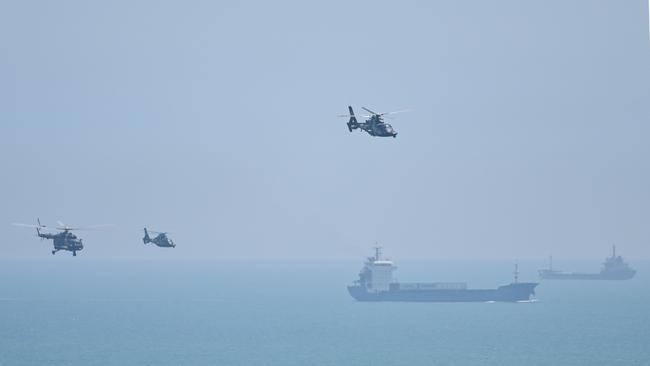
Mr Bell added the northern zone nudges into Taiwan’s territorial waters, which risks being “extremely provocative” if any munitions land too close to the Taiwan mainland.
National Security Council spokesman John Kirby confirmed on Friday that the Chinese ambassador had been summoned to “démarche him” about the military operations.
“We also made clear that the United States is prepared for what Beijing chooses to do. We will not seek and do not want a crisis,” Kirby said,” he told Reuters.
“At the same time, we will not be deterred from operating in the seas and skies of the Western Pacific, consistent with international law, as we have for decades -- supporting Taiwan and defending a free and open Indo-Pacific.”
A senior Chinese Embassy official in Washington responded to the reprimand by blaming the US for being the “troublemaker” and warning the Biden administration not to “push” the two countries towards war.
“The only way out of this crisis is that the US side must take measures immediately to rectify its mistakes and eliminate the grave impact of Pelosi’s visit,” Jing Quan told the outlet.
CHINA CANCELS US CO-OPERATION
China on Friday said it was cancelling several defence meetings and suspending key climate talks with the United States after Ms Pelosi’s to Taiwan last week.
Beijing will “suspend the China-US climate change talks” and nix plans for a call between military leaders as well as two security meetings, the foreign ministry said, citing Ms Pelosi’s “disregard of China’s strong opposition and stern representations” on the Taiwan visit.
China and the United States – the world’s two largest carbon emitters – unveiled a surprise climate pact at the COP26 summit in Glasgow last year.
They pledged to work together to accelerate climate action this decade, and vowed to meet regularly to “address the climate crisis”.
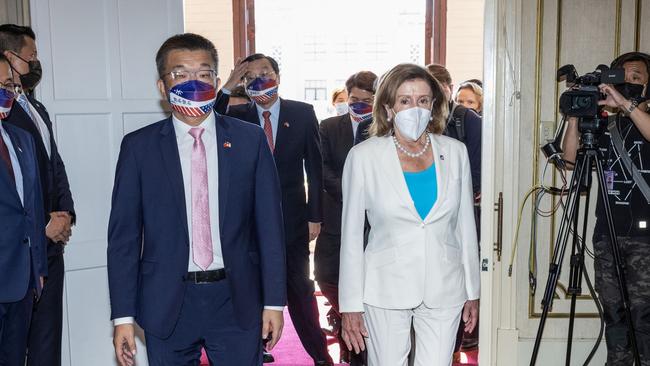
China views self-ruled, democratic Taiwan as part of its territory and has vowed to one day take it, by force if necessary.
Beijing’s foreign ministry said on Friday it was suspending co-operation with Washington on repatriating illegal migrants, judicial assistance and transnational crime, as well as anti-drug action.
JAPAN FURIOUS AFTER CHINA FIRES MISSILES
Japan’s prime minister condemned China’s firing of ballistic missiles during military drills around Taiwan, calling them a “serious problem that impacts our national security and the safety of our citizens”.
Five Chinese missiles appear to have fallen in the country’s exclusive economic zone (EEZ), Tokyo’s defence ministry said, with four of those believed to have flown over Taiwan’s main island.
“China’s actions this time around have a serious impact on the peace and stability of our region and the international community,” Prime Minister Fumio Kishida told reporters last week after meeting US House Speaker Nancy Pelosi for breakfast.
“I told her that we have called for the immediate cancellation of the military drills.”
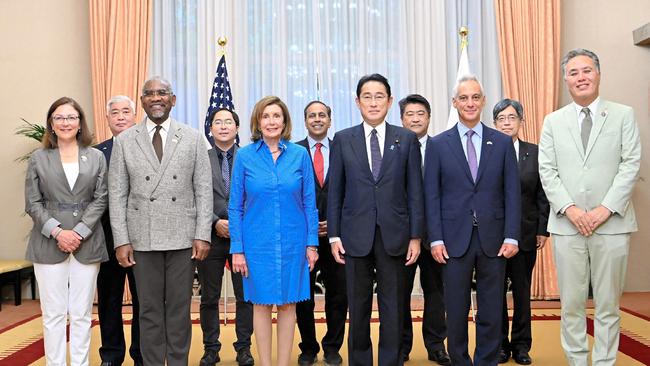
Japanese defence minister Nobuo Kishi said Tokyo has lodged a diplomatic protest with Beijing over the military exercises, which began on Thursday.
“To have five Chinese missiles fall within Japan’s EEZ like this is a first,” Mr Kishi said.
Ms Pelosi is in Tokyo for the final leg of an Asian tour that included a stop in Taiwan, infuriating Beijing, which has launched its largest-ever military drills around the self-ruled island in response.
The 82-year-old politician defied stern threats from China to become the highest-profile US official to visit Taiwan in years, saying her trip made it “unequivocally clear” the United States would not abandon a democratic ally.
China views Taiwan as part of its territory and has vowed to retake the island one day, by force if necessary.
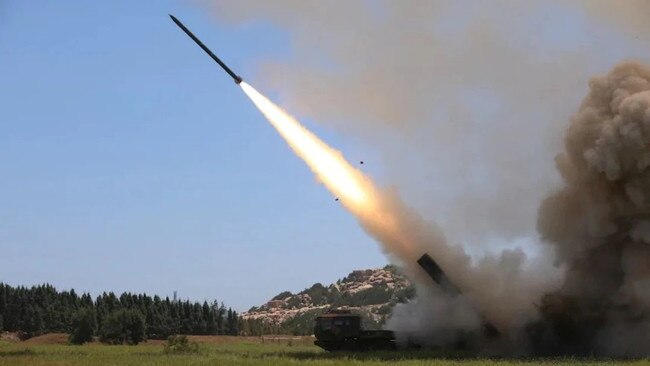
Mr Kishida said he and Ms Pelosi discussed geopolitical issues including matters related to North Korea, China and Russia, as well as efforts towards a nuclear-free world.
The American arrived Thursday night from South Korea, another key US ally, where she visited the border with the nuclear-armed North. It is her first time in Japan since 2015.
Parts of Japan’s southernmost Okinawa region are close to Taiwan, as are islets at the centre of a long-running dispute between Tokyo and Beijing.
Japan’s exclusive economic zone (EEZ) extends up to 200 nautical miles from its coastline, beyond the limits of its territorial waters.
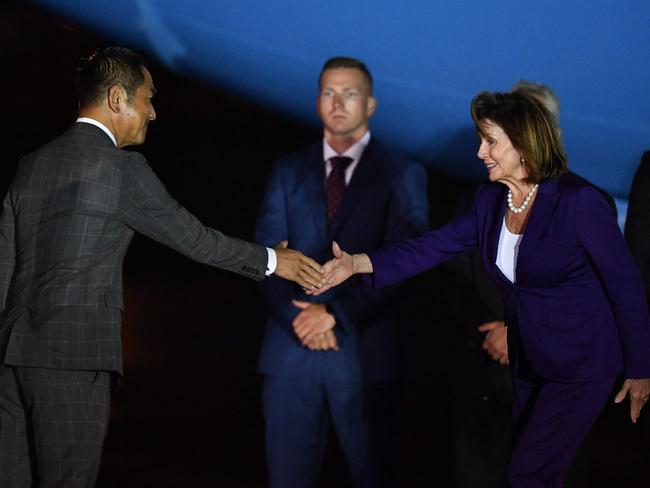
‘IRRATIONAL’: TAIWAN CONDEMNS MILITARY DRILLS
Taiwan said the Chinese military fired 11 Dongfeng-class ballistic missiles “in several batches” and condemned the exercises as “irrational actions that undermine regional peace”.
Taipei did not say where the missiles landed or whether they flew over the island.
AFP journalists on the border island of Pingtan saw several small projectiles flying into the sky followed by plumes of white smoke and loud booming sounds.
On the mainland, at what is said to be China’s closest point to Taiwan, AFP saw a batch of five military helicopters flying at a relatively low altitude near a popular tourist spot.
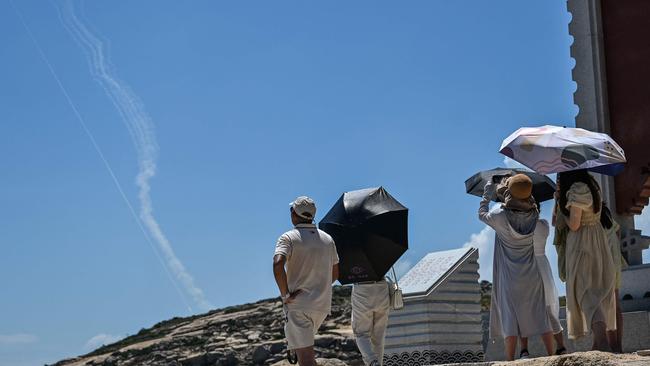
China defended the drills as “necessary and just”, pinning the blame for the escalation on the United States and its allies.
“In the face of this blatant provocation, we have to take legitimate and necessary countermeasures to safeguard the country’s sovereignty and territorial integrity,” foreign ministry spokeswoman Hua Chunying said at a regular briefing Thursday.
Military analysts told Beijing’s state broadcaster CCTV that the goal was to practice a possible blockade of the island and contain its pro-independence forces.
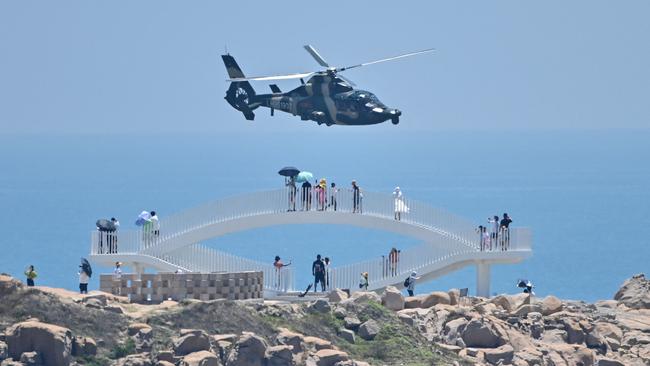
“The purpose is to show that the PLA is capable of controlling all the exits of the Taiwan Island, which will be a great deterrent to ‘Taiwan independence’ secessionist forces,” Zhang Junshe, a senior researcher at China’s Naval Research Institute, said.
“The operations are conducted in an unprecedentedly close range to the Taiwan Island,” Meng Xiangqing, a military expert, stressed.
“The operations will leave a deterrence effect that is stronger than ever before.” The manoeuvres are taking place along some of the busiest shipping routes on the planet, used to supply vital semiconductors and electronic equipment produced in East Asian factory hubs to global markets.
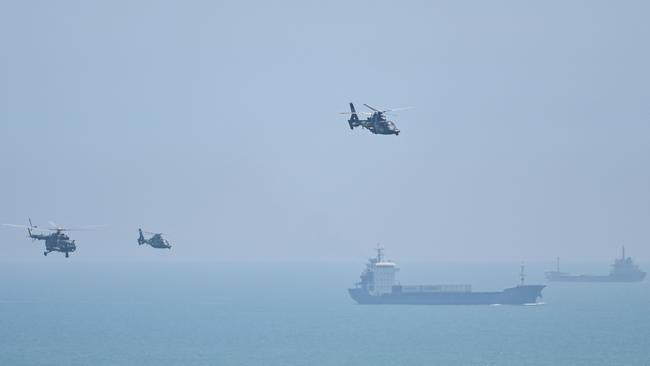
Taiwan’s Maritime and Port Bureau has issued warnings to ships to avoid the areas being used for the Chinese drills.
And the Taiwanese cabinet said the drills would disrupt 18 international routes passing through its flight information region (FIR).
Taiwan’s 23 million people have long lived with the possibility of an invasion, but that threat has intensified under President Xi Jinping, China’s most assertive ruler in a generation.
Analysts said the Chinese leadership is keen to project strength ahead of a crucial ruling party meeting this autumn at which Xi is expected to be given an unprecedented third term.
“China’s announced military exercises represent a clear escalation from the existing baseline of Chinese military activities around Taiwan and from the last Taiwan Strait Crisis in 1995-1996,” said Amanda Hsiao, senior analyst for China at the International Crisis Group.
“Beijing is signalling that it rejects Taiwan’s sovereignty.”
Nevertheless, analysts have told AFP that China is not aiming to escalate the situation beyond its control – at least for now.
Titus Chen, an associate professor of political science at the National Sun Yat-Sen University in Taiwan, said: “The last thing Xi wants is an accidental war.”
TAIWAN FIRES ON CHINESE DRONES
Taiwan fired flares at suspected drones that soared over its territory of the Kinmen islands, as another cyber attack hit a key government website.
The heavily fortified islands are just off the southeastern coast of China, and such action is relatively common, but comes amid heightened tensions and as China prepares for military exercises.
Major General Chang Zone-sung of Kinmen Defence Command said the drones came in a pair and flew over the islands twice.
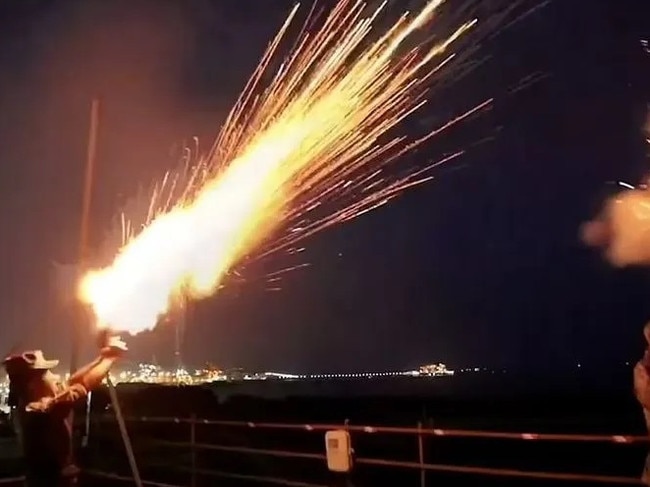
“We immediately fired flares to issue warnings and to drive them away. After that, they turned around. They came into our restricted area and that’s why we dispersed them,” he told Reuters.
“We have a standard operating procedure. We will react if they come in,” Major General Chang said.
The drones were thought to be gathering intelligence about Taiwanese military movements.
Meanwhile, the Taiwan defence ministry confirmed its website was hit with cyber attacks and went offline on Thursday.
Many other websites suffered cyber attacks earlier this week, including the presidential office, some of which have been blamed on China and Russia.
GLOBAL LEADERS CALL FOR CALM
Group of Seven leaders urged Beijing to show restraint, saying there was “no justification” for “aggressive” military drills in the Taiwan Strait.
It comes as Taiwan’s defence ministry announced that 27 Chinese warplanes had entered the island’s air defence identification zone (ADIZ) after Ms Pelosi’s departure.
Ms Pelosi and her delegation flew out of Taipei on Wednesday after a roughly 19-hour visit that was the first by a US House speaker in 25 years.
The 82-year-old defied a series of increasingly stark threats from Beijing, which views the island as its territory and warned it would consider the visit a major provocation.
China later announced what it said were “necessary and just” military drills in the seas just off Taiwan’s coast - some of the world’s busiest waterways.
“In the current struggle surrounding Pelosi’s Taiwan visit, the United States are the provocateurs, China is the victim,” Beijing’s foreign ministry said.
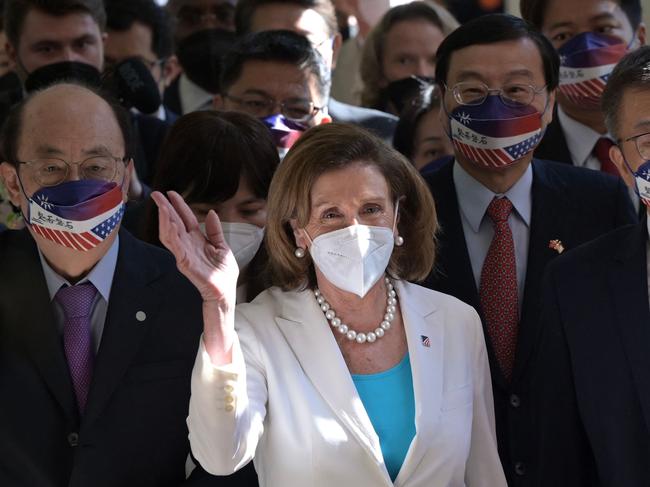
Beijing also announced sanctions on Taiwan, suspending citrus and seafood products — although the bans were officially linked to hygiene concerns.
China has also suspended the export of natural sand to Taiwan, a key ingredient for the production of semiconductor chips.
Taiwan’s Bureau of Mines later outlined that the ban would have “limited” effect.
Ms Pelosi’s trip had so enraged mainland China that the country’s most popular social media platform, Weibo, crashed for about 30 minutes, confirming it was overstretched as several hashtags racked up several billion views.
But Taiwanese President Tsai Ing-wen said the island of 23 million would not be cowed.
“Facing deliberately heightened military threats, Taiwan will not back down. We will … continue to hold the line of defence for democracy,” Ms Tsai said at an event with Ms Pelosi in Taipei.
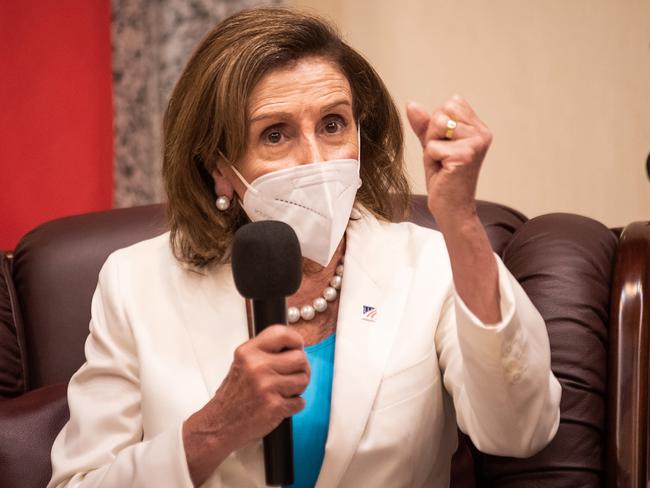
She also thanked the American for “taking concrete actions to show your staunch support for Taiwan at this critical moment”.
China tries to keep Taiwan isolated on the world stage and opposes countries having official exchanges with Taipei.
“Today, our delegation … came to Taiwan to make unequivocally clear we will not abandon our commitment to Taiwan,” Ms Pelosi said at the event with Tsai.
Before leaving Taiwan, Ms Pelosi also met with several dissidents who have previously been in the crosshairs of China’s wrath - including Tiananmen protest student leader Wu’er Kaixi.
“Both the United States and Taiwan governments need to … conduct more in defending human rights,” Wu’er said.
Ms Pelosi’s delegation is headed to South Korea, her next stop in an Asia tour that has included visits to Singapore and Malaysia.
She will wrap up her trip in Japan.
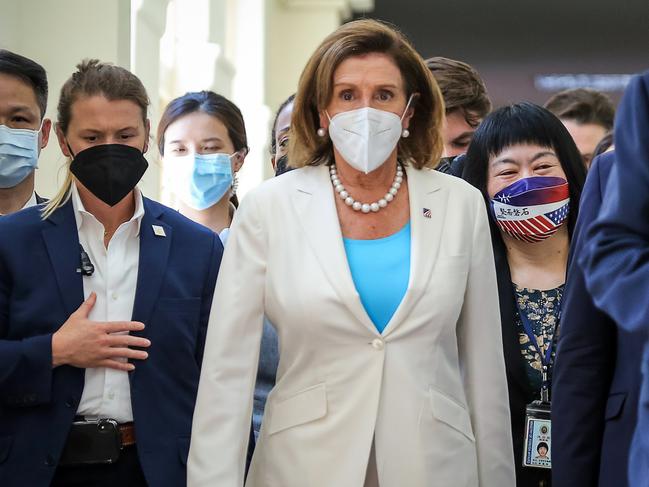
Over the last two years, Beijing has ramped up military incursions into Taiwan’s ADIZ - which is not the same as the island’s territorial airspace, but includes a far greater area – but that is still a relatively rare occurrence.
The ministry published a map that showed 16 Su-30s and 6 J-11s had crossed the so-called “median line” of the Taiwan Strait - an unofficial boundary in the narrow waterway, which separates the island from the mainland and straddles vital shipping lanes.
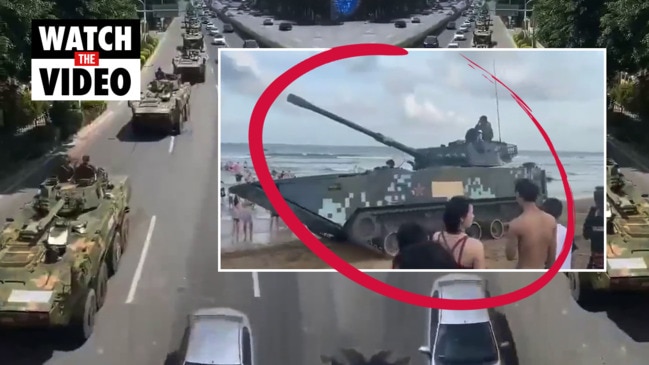
Former Australian prime minister Kevin Rudd warned Ms Pelosi’s visit was adding “fuel to the fire”.
Speaking with the BBC, Mr Rudd sounded alarm bells over the US visit and what it could mean for the region.
“The US-China relationship has become red raw in recent years,” Mr Rudd said.
“Pelosi’s visit throws fuel on the fire. I doubt China is about to ignite a shooting match with the US over it. But they will unleash a bunch of countermeasures against Taiwan itself.”
The US-China relationship has become red-raw in recent years. Pelosi's visit throws fuel on the fire. I doubt China is about to ignite a shooting match with the US over it. But they will unleash a bunch of countermeasures against Taiwan itself. My comments on @BBCWorld. pic.twitter.com/dmWw7lzAeu
— Kevin Rudd (@MrKRudd) August 2, 2022
Ms Pelosi is currently on a tour of Asia which includes visits to Singapore, Malaysia, South Korea and Japan. Her trip to Taiwan was anticipated but not confirmed by US officials.
Japan has also expressed concern to China over its military drills in waters around Taiwan, a government spokesman said Wednesday.
“The maritime areas announced by the Chinese side as those to be used for military exercises … overlaps with Japan’s exclusive economic zone. Considering the live-fire training nature of this military activity, Japan has expressed concerns to the Chinese side,” Chief Cabinet Secretary Hirokazu Matsuno told reporters.
More Coverage
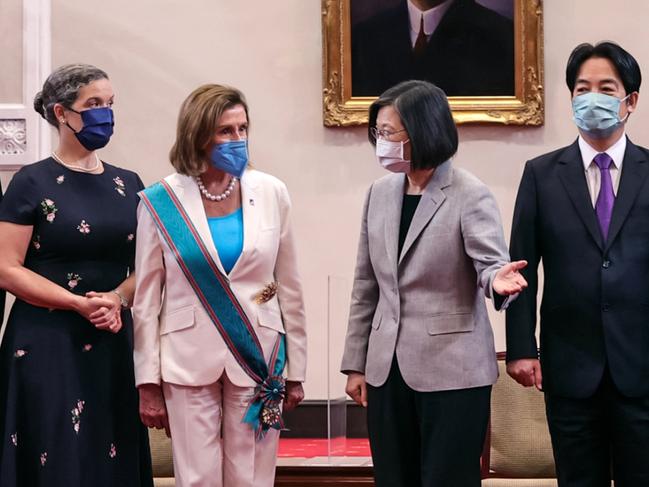
Originally published as Peter Dutton: China military response to US House Speaker Nancy Pelosi visit ‘disproportionate’
Read related topics:Australia-China relations



